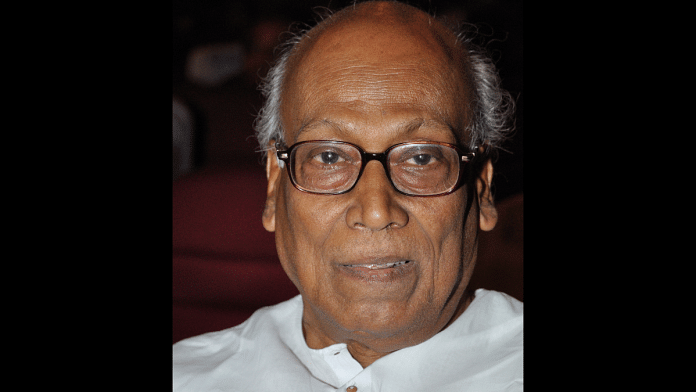Sankha Ghosh’s poem was once banned from publication in the ‘puja edition’ of Desh, the most prestigious literary journal of Bengal, in 1975 during Indira Gandhi’s Emergency. Then, after the Nandigram massacre by the Left Front government in the state, Sankha Ghosh was one of the most prominent faces leading the 2007 rally from Kolkata’s College Square to Esplanade. The poet had even refused an award in 1998 from former Prime Minister Atal Bihari Vajpayee because the Bharatiya Janata Party had played Mandir-Masjid card to win elections.
A year ago, in his book of poems, Simantabihin Deshe Deshe (Countries Without Boundaries), Ghosh sarcastically criticised the monstrous corruption rampant in the State machinery of the Mamata Banerjee government. Sankha Ghosh’s poem Bishrambhalap (Idle Words) documents a casual conversation between two domestic workers about ‘cut money’ – a constant problem for welfare scheme beneficiaries in Bengal. He even called out the civil society members who organise regular protest marches for media ‘footage’. A young Adibasi utters his frustrations in Ghosh’s poem Khokkosraj (Rule of Demons) in rustic Bengali. The young Adibasi protagonist says, “Probably, Babus of the metropolis will fill up the roads with rallies after rallies. They will give provocative slogans. Then when they think that their responsibilities are over, they will go for a siesta.”
Sankha Ghosh was one of those very few who could stand fearlessly before the political supremo of any party. His sad demise this week due to Covid-19 has created a vacuum in the civil society movement in Bengal.
Also read: Bengali poet Shankha Ghosh dies of Covid at 89
A scholar and a critique
Sankha babu, in his early days, was well-known for his love-poem series Dinguli Ratguli (Days and Nights) published in the magazine Krittibas, edited by Sunil Gangopadhyay. And yet, he was not attracted by the bohemianism of Sunil and his Krittibas group who were friends with American Beat poet Allen Ginsberg. Instead, Ghosh was mentored by Marxist poet Subhash Mukhopadhyay, and he preferred depicting agonies of the hungry people that thronged the Kolkata streets after Partition of 1947. Though Subhash praised Ghosh’s poem Yumanabati for giving voice to the hungry millions of Bengal, poet Buddhadeva Bose, a cult figure in Bengali literary culture who even received affection from Rabindranath Tagore, openly ridiculed young Sankha at a poetry festival in Santiniketan in the 1950s for his loud portrayal of mere reality.
But Sankha did not move an inch from his stand and gradually honed his pen to give voice to the oppressed. For him, the primary aim of a civil society movement was to accommodate the voices from the margins.
But Sankha Ghosh wasn’t just a poet.
Also read: Tagore’s ‘Ramrajya’ didn’t have one Rama. Hindutva soldiers should know that
As a sensitive Tagore scholar, Ghosh focused on Rabindranath’s works and praxis that helped the Nobel laureate continue the civil society movement in Bengal. After withdrawing himself from the anti-partition movement of 1905, Tagore always worked for society from outside the political arena. Besides composing patriotic poems and songs, he wrote political essays and delivered lectures to make colonised people conscious of their rights. These political essays of Tagore generally begin with the citation of a particular contemporary issue and end on a universal philosophical note. When Subhas Chandra Bose was rusticated from Presidency College (now University) for assaulting professor E.F. Otten over a racist remark, Rabindranath wrote an essay titled Chatrasashontantra (Rules for Students) that referred to the Subhas-Otten incident but moved on to broader philosophical arguments on the teacher-student relationship in an academic institution.
Ghosh followed Tagore’s style of moving from the particular to the universal in his political essays written in the last two decades. His Pranabesh Sen Memorial Lecture in 2007 tried to take a re-look at Fascism. Sankha Ghosh gave importance to empathy and patient hearing. Unless we hear the voice and words of others, tolerance will not grow in our politics and society. He writes, “Fascism is nothing but an uncontrolled scream of our nature.” In colonial India, jingoism, communalism, Fascism and unbridled lust for money were the four blemishes that got strong disapproval from Tagore. Ghosh observed that these symptoms were manifest in many ways in the Bengal politics of the late 1990s.
With the passing away of a rational voice like that of Sankha Ghosh, Bengal politics has again become vulnerable.
The author is an associate professor of Bangla at Visva Bharati University in Santiniketan. He has written in ‘The Cambridge Companion To Rabindranath Tagore‘ (2019). Views are personal.




End of a great generation.